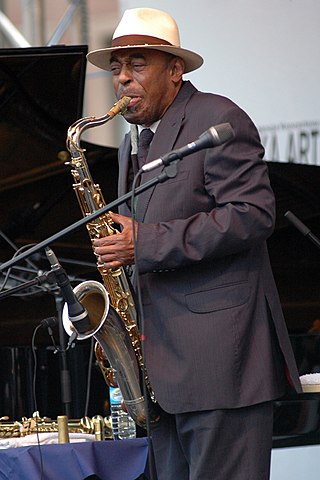
Archie Shepp is an American jazz saxophonist, educator and playwright who since the 1960s has played a central part in the development of avant-garde jazz.
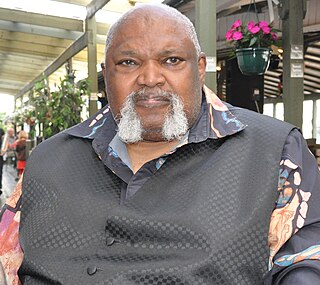
Theodore Curson was an American jazz trumpeter.

The Major Works of John Coltrane is a compilation album by jazz musician John Coltrane, released in 1992 by GRP Records. It features extended compositions, all recorded in 1965 with expanded ensembles, and originally released by Impulse! Records on Ascension, Om, Kulu Sé Mama, and Selflessness: Featuring My Favorite Things. Both editions of Ascension are included.
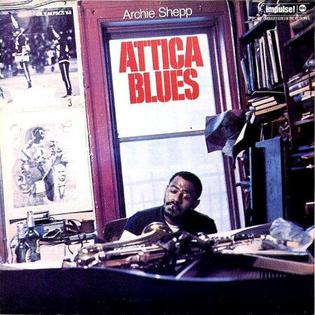
Attica Blues is an album by avant-garde jazz saxophonist Archie Shepp. Originally released in 1972 on the Impulse! label, the album title refers to the Attica Prison riots.
Robin Kenyatta was an American jazz alto saxophonist.

Four for Trane is a studio album by tenor saxophonist Archie Shepp released on Impulse! Records in 1965. Four of the five tracks were composed and originally recorded by John Coltrane and rearranged by Shepp and trombonist Roswell Rudd. The other featured players are trumpeter Alan Shorter, alto saxophonist John Tchicai, bassist Reggie Workman and drummer Charles Moffett. Coltrane himself co-produced the album alongside Bob Thiele. The album was Shepp's first release for Impulse!
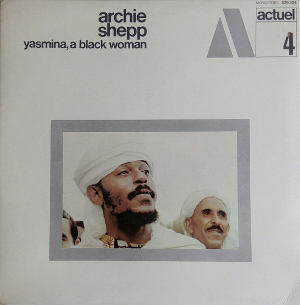
Yasmina, a Black Woman is a jazz album by Archie Shepp, recorded in 1969 in Paris for BYG Actuel. It features musicians from the Art Ensemble of Chicago. The first track, giving its title to the album, is a long free jazz piece by an 11-piece orchestra; in it, the references to Africa that Shepp had experimented with only a few weeks earlier in Algiers are to be found in the use of African percussion instruments, or the African incantations sung by Shepp himself at the beginning of the track. The other two pieces, a homage to Sonny Rollins written by trombonist Grachan Moncur III and a standard, played by a more traditional quintet and quartet respectively, are more reminiscent of the hard bop genre, although the fiery playing of the musicians, notably Shepp himself, gives them a definite avant-garde edge. It was originally issued on CD by Affinity, mastered from an incredibly noisy vinyl source and later reissued by Charly from the original master tapes.
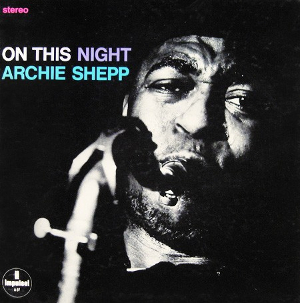
On This Night is an album by Archie Shepp released on Impulse! Records in 1965. The album contains tracks recorded by Shepp, bassist David Izenzon and drummer J. C. Moses in March 1965 and with a larger band in August of that year that included vibraphonist Bobby Hutcherson, bassist Henry Grimes and percussionists Ed Blackwell, Joe Chambers and Rashied Ali.

Things Have Got to Change is an album by avant-garde jazz saxophonist Archie Shepp released in 1971 on the Impulse! label. The album features a performance by Shepp with a large ensemble and vocal choir. The album "solidified the saxophonists reputation as a soulful, yet radical free jazz artist motivated by social commentary and cultural change".

Kwanza is an album by Archie Shepp released on Impulse! in 1974. The album contains tracks recorded from September 1968 to August 1969 by Shepp with four different ensembles.
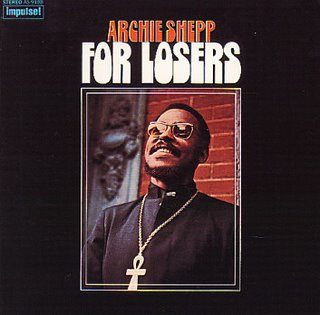
For Losers is an album by Archie Shepp released on Impulse! in 1970. The album contains tracks recorded from September 1968 to August 1969 by Shepp with three different ensembles. The AllMusic review by Rob Ferrier states "for anyone wishing to understand the music and career of this brilliant musician, this is an undervalued piece of the puzzle".

Into the Hot is an album released under the auspices of Gil Evans featuring a large ensemble under the direction of John Carisi and the Cecil Taylor Unit. The album was released on the Impulse! label in 1962.

Mixed is a compilation album of two avant-garde jazz sessions featuring performances by the Cecil Taylor Unit and the Roswell Rudd Sextet. The album was released on the Impulse! label in 1998 and collects three performances by Taylor with Archie Shepp, Jimmy Lyons, Henry Grimes and Sunny Murray with Ted Curson and Roswell Rudd added on one track which were originally released under Gil Evans' name on Into the Hot (1961). The remaining tracks feature Rudd with Giuseppi Logan, Lewis Worrell, Charlie Haden, Beaver Harris and Robin Kenyatta and were originally released as Everywhere (1966). Essentially these are the three Cecil Taylor tracks from the "Gil Evans album" teamed with Roswell Rudd's Impulse album Everywhere, in its entirety.

Bill Dixon 7-tette/Archie Shepp and the New York Contemporary 5 is an album released on the Savoy label originally featuring one LP side by Bill Dixon's septet and one LP side by the New York Contemporary Five featuring saxophonist Archie Shepp. The album resulted from Dixon and Shepp's contractual obligations to provide Savoy Records with a second album after the Archie Shepp - Bill Dixon Quartet (1962) but following a professional separation.
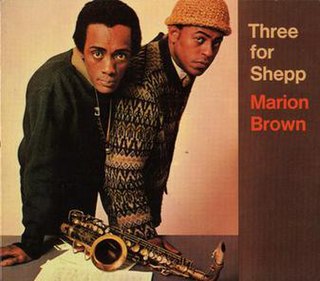
Three for Shepp is an album by American saxophonist Marion Brown featuring performances recorded in 1966 for the Impulse! label.
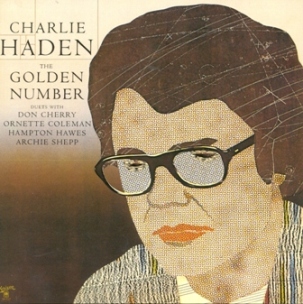
The Golden Number is an album of four duets by bassist Charlie Haden recorded in 1976 and released on the Horizon label in 1977. Haden’s duet partners are trumpeter Don Cherry, tenor saxophonist Archie Shepp, pianist Hampton Hawes and alto saxophonist Ornette Coleman. Hawes died shortly before the album’s release, and Haden dedicated the work to him in the liner notes.

The New Wave in Jazz is a live album recorded on March 28, 1965 at the Village Gate in New York City. It features groups led by major avant-garde jazz artists performing at a concert for the benefit of The Black Arts Repertory Theater/School founded by Amiri Baraka, then known as LeRoi Jones. The album was released on LP in 1965 on the Impulse! label, and was reissued on CD in 1994 with a different track listing.

Marion Brown Quartet is an album by American saxophonist Marion Brown, his debut as a leader. It was recorded in November 1965 in New York City, and was released in 1966 on the ESP-Disk label. The album features Brown on alto saxophone, Alan Shorter on trumpet, Bennie Maupin on tenor saxophone, Reggie Johnson and Ronnie Boykins on bass, and Rashied Ali on drums.
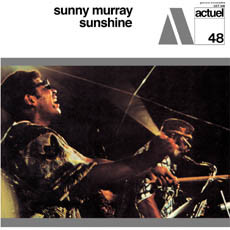
Sunshine is an album by American free jazz drummer Sunny Murray, his third as a leader. It was recorded in Paris in August 1969, and released on the BYG Actuel label later that year. On the album, Murray is joined by Arthur Jones and Roscoe Mitchell on alto saxophone, Archie Shepp and Kenneth Terroade on tenor saxophone, Lester Bowie on trumpet, Dave Burrell on piano, and Malachi Favors and Alan Silva on bass.

Homage to Africa is an album by American free jazz drummer Sunny Murray. It was recorded in Paris in August 1969, and released on the BYG Actuel label in 1970. On the album, Murray is joined by saxophonists Roscoe Mitchell, Archie Shepp and Kenneth Terroade, trumpeter Lester Bowie, cornetist Clifford Thornton, trombonist Grachan Moncur III, vocalist Jeanne Lee, pianist Dave Burrell, bassist Alan Silva, and percussionists Malachi Favors, Earl Freeman, and Arthur Jones.



















